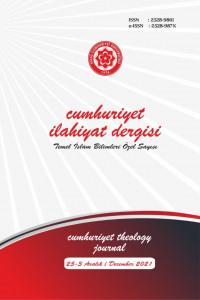Mahiyet-Keyfiyet Sarkacında Kur’an Mûcizesi
The Miracle of the Qurʾān in the Pendulum of Nature-Modality
Author(s): Mahmut AyyıldızSubject(s): Metaphysics, Islam studies, Phenomenology, Qur’anic studies
Published by: Cumhuriyet Üniversitesi İlahyat Fakültesi
Keywords: Tasfir;Qur'an;Miracle;djaz al-Qur'an;Nature;Usage;
Summary/Abstract: Miracles are extraordinary events that occur in the hands of those who claim to be prophets and which cannot be repeated by others. By these miracles, the prophets prove to society that the truths they convey are of divine origin. The miracles bestowed upon prophets vary according to the scope of the message they deliver and the interests and relevance of the societies with which they deal. Accordingly, Islamic scholars have classified miracles into three groups. The miraculous events that appeal to people’s senses and lead them to the truths they convey by captivating their astonishment are called emotional miracles. Such miracles are events that occur without cause by overcoming the laws of nature, which are in the realm of causes, through the direct intervention of Allāh. On the other hand, spiritual miracles are truths that arouse the interlocutor’s interest in moral conduct and rational conclusions rather than in his sensory perceptions. Since these truths are attained through contemplation, they are not confined to a particular time and place, as in the case of emotional miracles. Some Kalām scholars have also considered the Prophets’ revelational knowledge about events that have occurred in the past or will occur in the future as miracles. They have studied these events that a person could not bear in the past or could not predict for the future under the title of "The news miracle" Among these three types of miracles, scholars have considered spiritual miracles superior to the others both in terms of the breadth of their influence and their continuity. That Prophet Muhammad (PBUH) is the last of the prophets, and that the teachings he received through revelation remain valid until the Day of Judgment necessitates that some of the miracles bestowed upon him must be of a quality that attracts the attention of all people. For this reason, Islamic scholars have placed the permanent miracle of Prophet Muhammad in the category of spiritual miracles. Scholars agree that his greatest miracle that has astonished all humankind is the Qurʾān. The clearest proof of this are the verses in the Qurʾān that challenge the opponents to bring a similar one. Allāh commands the disbelievers first to bring a similitude of the Qurʾān (al-Isrāʾ 17:88), then the equivalent of ten surahs (Hūd 11:13), and finally any surah of the Qurʾān (al-Baqara 2:23). Thus, the deniers are made aware of their inability to meet this challenge under gradually mitigating circumstances. Although scholars agree on the Qurʾānic miracle’s reality, they have expressed different views on its nature and essence. Thus, some scholars have argued that the miracle of the Qurʾān does not arise from some properties special to it but from the direct intervention of Allāh in human who have the ability to bring something like it. Most Islamic scholars, on the other hand, pointed out that the Qurʾān has aspects that exceed human powers in various fields, and they explained the inability to reply in the same vein to the Qurʾān due to its uniquenesses. Accordingly, some scholars have argued that miracles are perceptible, but it is never possible to define them. Other scholars, however, viewed miracles as an identifiable phenomenon and stated that the Qurʾān is an unusual and unique book in terms of verses. In this article, the questions Why was the Quran sent down as a miraculous Kalam with an attribute not found in other divine books and in what way did the Qurʾān make people weak to have a similar of it? were scrutinized, thus, some fundamental questions regarding the nature and character of iʿdjāz al-Qurʾān are elucidated. Since the topic deals with history and literature, scanning sources and data analysis were mainly used as methods in the research. The results can be summerized as follows: Although the Prophet was supported by both emotional and mental miracles in proving the Prophetic case, his greatest miracle is the Quran. The miracle of the Qurʾān is different from the other miracles, based on both the challenging verses and the Prophet's explanations of the miracles. The reason for this difference lies in the fact that the miracle of the Qurʾān is based on reason, unlike the other miracles which are emotional. Most Islamic scholars who deal with the miracle of the Qurʾān emphasize the issues of rhetoric, verse, style, and content. At this point, they emphasized that the Qurʾān has a unique expression and content that cannot be surpassed.
Journal: Cumhuriyet İlahiyat Dergisi
- Issue Year: 25/2021
- Issue No: 3
- Page Range: 1103-1122
- Page Count: 20
- Language: Turkish

